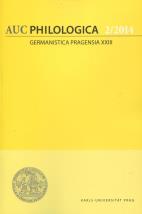„Ein Mekka für Konkretisten“ – Tschechische und internationale experimentelle Dichtung in Prag 1958–1968
“A Mecca for Concretists”– Czech and international experimental poetry in Prague 1958–1968
Author(s): Astrid WinterSubject(s): Language and Literature Studies
Published by: Univerzita Karlova v Praze, Nakladatelství Karolinum
Summary/Abstract: This paper deals with the diverse phase of multinational mutual literary exchanges in 1960s Prague, which has been only rarely covered by the German-speaking history of literature and comparative literature because of its informal nature. The article focuses on the connections between Czech experimental poetry and international visual, concrete and sound poetry in Czechoslovakia. With its roots in the criticism on the doctrine of socialist realism and the quasi-schizophrenic use of language in the communist Czechoslovakia, the ability to manipulate the poetic word became the topic of Czech independent literature in the late 1950s. In the decade prior the Warsaw Pact invasion in 1968, innovative and occasionally bizarre poetic forms and projects crossing the bridge between different types of media, types of art and literary genres were created, based on the word analysis conducted by philosophy of language and linguistics. Whilst the first creators of experimental poetry Jiří Kolář (1914–2002) and Ladislav Novák (1925–1999) were still rather untouched by the international development of the concrete poetry in the late 1950s, the more recent authors Josef Hiršal (1920–2003) and Bohumila Grögerová (born 1921) tried to overcome the cultural isolation in the early 1960s, getting in touch with German, Austrian and subsequently French, Italian, English and Brazilian writers. In a relatively liberal age, a branched international network was created, with Prague as its integrating centre.
Journal: Acta Universitatis Carolinae Philologica
- Issue Year: 2014
- Issue No: 2
- Page Range: 225-271
- Page Count: 45
- Language: German

